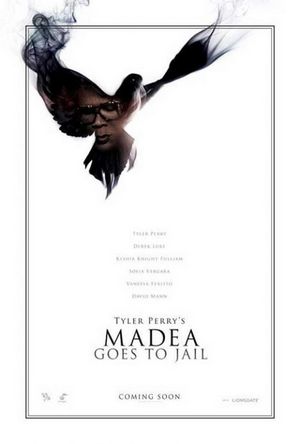- Comics
- Comics Reviews
- Manga
- Comics Reviews
- European Comics
- News
- Comics News
- Press Releases
- Columns
- Spotlight
- Digital Comics
- Webcomics
- Cult Favorite
- Back Issues
- Webcomics
- Movies
- Toys
- Store
- More
- About
By Leroy Douresseaux
June 30, 2009 - 09:32
 |
In the seventh Tyler Perry movie (the sixth Perry has directed), his most popular character, the matriarch Mabel “Madea” Simmons, finally lands in jail in the film, Madea Goes to Jail. Madea’s commotions aside, this film’s primary focus is on the efforts of an up and coming attorney to save a former classmate from a life of drug addiction and prostitution.
A high speed car chase lands Madea (performed by Tyler Perry in drag) on the steps of the jail, but a technicality allows her another in a long line of reprieves. However, Madea’s anger management issues lead to an outrageous act of violence that finally earns her a stiff prison sentence. Madea’s eccentric family, including her daughter, Cora (Tamela J. Mann), and son-in-law, Brown (David Mann), rally behind her and lead the effort to free Madea.
Meanwhile, Assistant District Attorney Joshua Hardaway (Derek Luke), who is on the fast track to career success, reunites with an old friend, Candace Washington (Keshia Knight Pullman), who is a drug addict and prostitute known to customers and colleagues as “Candy.” Joshua is determined to get Candy cleaned up, off drugs, and off the streets, but they share a dark secret from their past, which seems to hamper efforts to heal Candy. Joshua’s fiancé and fellow ADA, Linda Davis (Ion Overman) is simply enraged at Joshua’s efforts to help Candy, and she plots to permanently separate the two.
Like Tyler Perry’s other films, Madea Goes to Jail is filled with broad comedy (quite a bit of it slapstick), Christian themes, and principles of forgiveness, healing, and redemption, but of all of his films, this is one comes across as the most shallow in its message. Perry’s films, by his own admission, are more than just entertainment; they are message films, so criticizing them on the basis on that message or how the message is delivered is legitimate.
Madea Goes to Jail is Perry’s most polished effort to date, in terms of technical and craft aspects of filmmaking. The direction is smooth, and Perry has cast a group of highly-qualified and veteran actors. These actors bring a sense of weighty drama to this occasionally very dark movie. When this movie was first released earlier this year (2009), much was made of former child star, Keshia Knight Pulliam’s turn as a drug-addicted prostitute. This faux controversy about Pulliam (who played Rudy Huxtable on The Cosby Show) missed the truth of the excellent dramatic performance given by the underestimated Pulliam – not to mention that such criticism missed excellent dramatic turns by Derek Luke and the recently Oscar-nominated Viola Davis (Doubt).
What Madea Goes to Jail should be criticized for is its ultimately dishonest and shallow message to its audience, in particularly Black women whose lives are in shambles because of drug addiction and because of past and present physical, mental, and sexual abuse. They suffer such abuse at the hands of loved ones. Madea Goes to Jail is actually a great film until the last 15 minutes or so. Tyler Perry is good at depicting suffering and anguish, but not as good when he suggests methods of healing. It is during the last 15 minutes of Madea Goes to Jail that Tyler Perry, as he rushes to tie everything in a feel-really-good, happy-ending bow, offers Christian platitudes (such as forgiveness) and self-help bromides as the cure for deep-rooted ills. When life gives you lemons, you make Jesus-flavored lemonade? I don’t think so.
I don’t begrudge Perry his happy endings, but if he must send messages, he is going to have to think seriously about the social and personal issues that he makes the centerpieces of his films. If he is going to offer answers and solutions, they should be more than “forgive and forget.” Otherwise, Madea Goes to Jail is an entertaining, at times exceptionally entertaining, film. But it could have been a truly important film.
B+